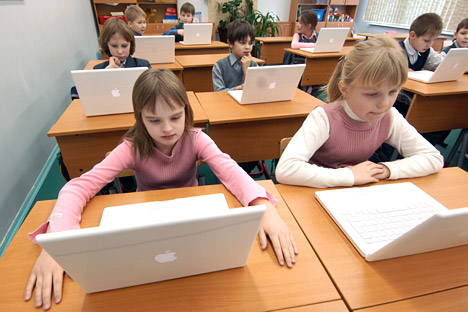MacBook catches on in Moscow elementary schools

Supplying schools with expensive computer equipment is part of the government’s campaign to change to a new state standard for elementary schools. Source: Sergey Pyatakov/RIA Novosti
The start of the new academic year was marked by the launch of brand new Apple desktops and MacBook laptops in schools. The first Apple computers were supplied for Moscow first-graders back in 2010, when students of 180 schools were equipped with MacBooks. In 2011, more than 1,500 Moscow schools received laptops for their first grade pupils. Second-graders also started using MacBooks this September.
Supplying schools with expensive computer equipment is part of the government’s campaign to change to a new state standard for elementary schools. This standard envisions studying in a digital/electronic environment, with electronic diaries, electronic textbooks and electronic registers. According to officials, the introduction of MacBook computers is also part of the ‘Our New School’ state programme, which was promoted by former president Dmitry Medvedev, a known Apple enthusiast.
What, how much and how
One of the objectives of the Information City (2012-2016) municipal programme is to equip Moscow schools with computers at a rate of 17 machines per 100 students by 2014. However, new laptops are not distributed evenly among schools. Because of the inconsistency of supplies, some schools have enough computers for both the first and second grades, while in others students have to share during classes. There are schools that have no Apple computers at all, parents of first-graders told Moskovskie Novosti.
The contract for the ‘supply of computing and telecommunications devices for equipping educational establishments of the city of Moscow in 2012’ also specifies the software to be used with the school MacBook laptops. The list includes the mathematics software packages Matryoshka and Live Mathematics, Live Word software for writing skills and the open creative environment PervoLogo, enabling first-graders to include cartoon illustrations in essays, and older pupils can simulate science experiments. There is a YouTube video with instructions how to work with PervoLogo (how to make a Kolobok roll).
“This software works fine on Windows”
Parents are divided on the introduction of these new computers, as their happiness about having their kids operating MacBooks is usually clouded by the high prices of Apple machines.
“My daughter was in the first grade not so long ago. The main problem was that their teacher was always telling them: ‘this is very expensive equipment – if you break it, you’ll have to pay for it to be fixed.’ The children were scared and didn’t like those classes,” Ksenia Sochilova, the mother of a pupil of school No 191, said. “They mostly worked with Matryoshka. You could access it from home, on the Internet. I thought it was exciting,” Sochilova added.
“My son was doing jigsaw puzzles during his first year and learning how to combine syllables. There was also some sort of a typing tutor. The kids loved it, and were not intimidated by the price. Teachers attended some special training. It’s fine, except for the project cost… This software works perfectly well on Windows. I’d rather they bought a regular laptop for everyone – it would be better and cheaper,” says Andrei Prokofyev, the father of a student of school No1286.
Konstantin Okunkov, whose son has just started third grade of school No1454, agrees. “I am familiar with software development, and I can say that of all the software programs adopted by schools, none are made exclusively for Mac computers. If our aim is to have economically justified software solutions for schools, then Windows will do just fine, while Linux or Android could take care of other tasks, as they would be much cheaper,” Okunkov says.
First published in Russian in Moskovskie Novosti newspaper.
All rights reserved by Rossiyskaya Gazeta.
Subscribe
to our newsletter!
Get the week's best stories straight to your inbox